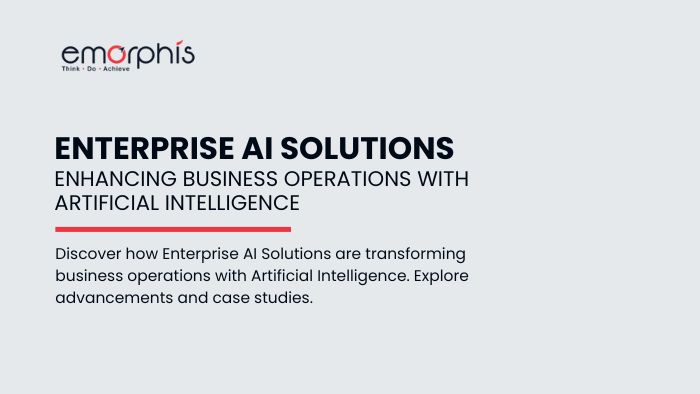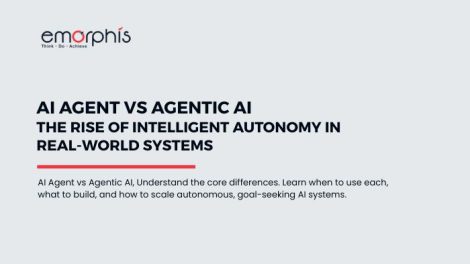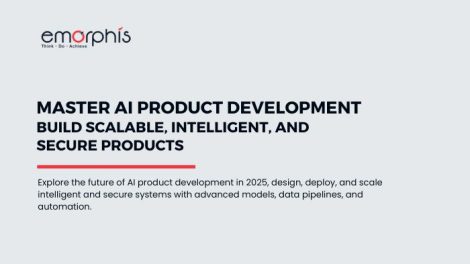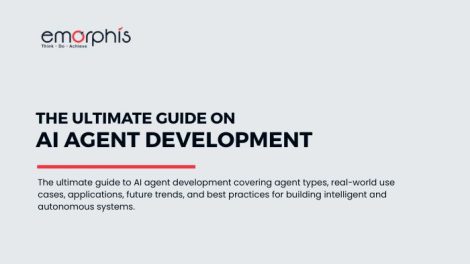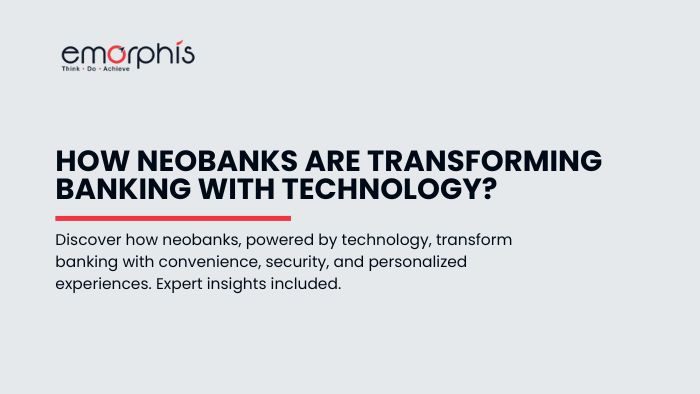Introduction
Welcome to the world of Enterprise AI solutions, where artificial intelligence meets business brilliance. In today's fast-paced corporate landscape, Enterprise AI is more than just a buzzword—it's a game-changer.
By integrating advanced AI technologies into operations, organizations can unlock new levels of innovation and efficiency. In fact, from automating tedious tasks to predicting future trends. Moreover, enterprise AI solutions are reshaping the way businesses operate, adapt, and thrive in the digital age. Let us explore more about Enterprise AI solutions now and discover how it's revolutionizing modern business operations.
Defining Enterprise AI and Its Role
Let's start by defining what we mean by Enterprise AI. Essentially, Enterprise AI refers to the use of artificial intelligence technologies within large organizations. In fact, this is to optimize various business processes and operations. Whether it's analyzing data, automating tasks, or enhancing decision-making. Enterprise AI solutions help in leveraging cutting-edge technology to drive efficiency and innovation. Moreover, in a competitive business landscape, Enterprise AI isn't just a luxury. In fact, it's a necessity for staying ahead of the curve and delivering exceptional results.
Importance of Enterprise AI
Why does Enterprise AI matter? In a nutshell, Enterprise AI holds the key to unlocking untapped potential within organizations. In fact, by harnessing the power of AI, businesses can streamline operations, improve productivity, and gain valuable insights from their data. Whether it's spotting emerging trends, personalizing customer experiences, or automating repetitive tasks. Moreover, Enterprise AI solutions empower organizations to work smarter. Also, embracing Enterprise AI isn't just a strategic advantage, in fact, it's essential for survival and success in the long run.
Connect to an AI Software Development Services Company for exploring various use cases for your industry.
Top Use Cases of Enterprise AI Solutions Across Industries
Enterprise AI is a powerful catalyst for reshaping industries on a global scale. Let's explore some of the top use cases of Enterprise AI across various sectors.
A. Retail
- Personalized Recommendations - Enterprise AI analyzes customer data to provide personalized product recommendations, also increasing sales and customer satisfaction.
- Inventory Management - AI-powered systems optimize inventory levels, reducing stockouts and overstocking, thus improving operational efficiency and profitability.
B. Healthcare
- Medical Diagnosis - Enterprise AI assists healthcare professionals in diagnosing diseases and recommending treatment plans. In fact, this is done by analyzing medical images, patient records, and genomic data.
- Drug Discovery - AI algorithms accelerate the drug discovery process. As a matter of fact, this is through predicting molecular properties, identifying potential drug candidates, and optimizing clinical trials.
Click the link to find the various key areas where AI is being used in healthcare - AI in healthcare.
C. Finance
- Fraud Detection - Enterprise AI detects fraudulent activities in real time. How? In fact, it is done by analyzing transaction patterns and customer behavior, minimizing financial losses, and protecting against cyber threats.
- Risk Management - AI-powered risk assessment models analyze market data, also customer profiles to assess credit risks. Moreover, optimizes loan approvals, and enhances portfolio management.
Find more details on AI in Fintech
D. Manufacturing
- Predictive Maintenance - Enterprise AI predicts equipment failures before they occur by analyzing sensor data, enabling proactive maintenance and minimizing downtime.
- Quality Control - AI-powered image recognition systems inspect products for defects, ensuring high-quality standards and reducing production costs.
Find more details on Industrial Automation
E. Transportation and Logistics
- Route Optimization - Enterprise AI optimizes delivery routes and schedules based on factors like traffic conditions, weather forecasts, also, fuel efficiency, reducing transportation costs and delivery times.
- Supply Chain Management - AI algorithms analyze supply chain data to predict demand, optimize inventory levels, and moreover, improve supply chain visibility and resilience.
F. Marketing and Advertising
- Customer Segmentation - Enterprise AI segments customers based on demographics, behaviors, and preferences, enabling targeted marketing campaigns and also, personalized messaging.
- Content Optimization - AI-powered content recommendation systems analyze user interactions and preferences to personalize website content, email campaigns, and social media posts, enhancing engagement and also, conversion rates.
G. Customer Service
- Chatbots and Virtual Assistants - Enterprise AI-powered chatbots provide instant support to customers, answering queries, resolving issues, and improving response times, thus enhancing customer satisfaction and reducing support costs.
- Voice Recognition - AI-driven voice recognition systems enable hands-free interaction with customer service channels, moreover, facilitating seamless communication and enhancing accessibility for users with disabilities.
H. Energy and Utilities
- Predictive Maintenance for Infrastructure - Enterprise AI analyzes sensor data from energy infrastructure, such as power plants and pipelines, to predict equipment failures, prevent downtime, and optimize maintenance schedules.
- Energy Demand Forecasting - AI algorithms analyze historical data and external factors like weather patterns. Also, market trends to predict energy demand, enabling utilities to optimize energy production and distribution, reduce costs, and improve grid stability.
I. Agriculture
- Precision Farming - Enterprise AI analyzes data from sensors, drones, and satellites to monitor crop health. This helps to optimize irrigation and fertilization and predict yields, moreover, leading to higher productivity, resource efficiency, and sustainability.
- Pest and Disease Detection - AI-powered image recognition systems identify pests, diseases, and moreover, crop abnormalities early on. This helps allow farmers to take proactive measures and also, minimize crop losses.
Get details on Smart Farming.
J. Human Resources
- Talent Acquisition - Enterprise AI automates candidate sourcing, screening, and matching processes. Thus, improving recruitment efficiency, reducing bias, and helping companies find the best talent faster.
- Employee Engagement and Retention - AI-powered analytics tools analyze employee feedback, sentiment, and also, behavior to identify factors influencing engagement and retention. Moreover, enabling organizations to implement targeted interventions and improve workplace satisfaction.
K. Education
- Personalized Learning - Enterprise AI algorithms analyze individual student data, including performance, learning preferences, and also behavior. This helps to create personalized learning paths. For example, if a student excels in visual learning, the system may recommend interactive videos or infographics for better understanding.
- Adaptive Assessment - AI-powered assessment platforms adapt questions and difficulty levels based on students' responses. Thus, providing targeted feedback and recommendations. For instance, if a student struggles with a certain concept, the system may offer additional resources or practice exercises tailored to their needs.
L. Real Estate
- Property Valuation - Enterprise AI utilizes algorithms to analyze factors such as property location, size, condition, and recent sales data to generate accurate valuations. For instance, an AI-powered tool may consider nearby amenities, market trends, and comparable properties to estimate a property's market value.
- Property Search and Recommendations - AI algorithms analyze user preferences, also search history, and behavior to recommend properties that match their criteria. For example, a real estate platform may suggest listings based on location, price range, desired amenities, and property type.
M. Legal Services
- Contract Analysis - Enterprise AI platforms employ natural language processing (NLP) and machine learning algorithms to review contracts and identify key clauses, obligations, and also risks. For instance, an AI tool may extract and categorize clauses related to payment terms, termination clauses, and indemnification provisions.
- Legal Research - AI-driven legal research platforms analyze vast amounts of case law. Also, status and legal documents provide insights and recommendations for legal professionals. For example, an AI tool may identify relevant precedents, summarize court decisions, and highlight relevant statutes to support legal arguments.
N. Entertainment and Media
- Content Creation and Curation - Enterprise AI generates personalized content recommendations based on user preferences, viewing history, and engagement patterns. For instance, a streaming platform may suggest movies, TV shows, or music playlists tailored to individual tastes and interests.
- Content Moderation - AI algorithms automatically detect and flag inappropriate content, such as hate speech, violence, or explicit imagery, to ensure a safe and positive user experience. For example, social media platforms may use AI-powered moderation tools to filter out harmful or offensive content before it reaches users' feeds.
O. Government and Public Services
- Citizen Services - Enterprise AI-powered virtual assistants and chatbots provide automated support and information to citizens, addressing common inquiries, processing requests, and guiding users through government services. For example, a virtual assistant may assist with passport applications, tax filings, or permit requests.
- Public Safety and Security - AI-driven analytics platforms analyze data from various sources, such as surveillance cameras, social media, and IoT sensors, to detect and prevent crime, monitor public spaces, and enhance emergency response. For instance, a city may use AI-powered systems to identify traffic congestion, detect anomalies in public areas, or predict patterns of criminal activity.
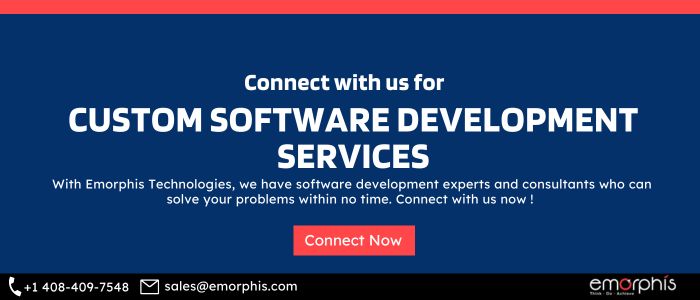
Identifying the Most Impactful Use Cases of Enterprise AI Across Diverse Industries
Enterprise AI is reshaping industries by empowering organizations to make smarter decisions, automate processes, and deliver personalized experiences to customers. The applications of Enterprise AI are endless and continue to drive innovation and growth across diverse sectors. Let's look at some of the following impacts of Enterprise AI.
1. Predictive Analytics: Anticipating Future Trends with Enterprise AI.
Predictive analytics is like a crystal ball for businesses, allowing them to foresee future trends and outcomes. Let's explore how Enterprise AI is powering this invaluable tool and driving insights for businesses.
1.1 Understanding Predictive Analytics and Its Integration with Enterprise AI.
Predictive analytics involves analyzing historical data to identify patterns and trends, which are then used to make predictions about future events or behaviors. When combined with Enterprise AI, predictive analytics becomes even more powerful. Enterprise AI algorithms can analyze vast amounts of data from various sources, including customer interactions, market trends, and operational metrics, to generate accurate predictions.
1.2 How Enterprise AI Powers Predictive Models for Business Insights.
Enterprise AI plays a crucial role in powering predictive models by processing and analyzing data to identify relevant patterns and correlations. These models can then be used to forecast future outcomes, such as customer behavior, sales trends, or equipment failures. By leveraging advanced machine learning algorithms, Enterprise AI enables businesses to make data-driven decisions and stay ahead of the curve.
1.3 Real-World Examples of Predictive Analytics Leveraging Enterprise AI.
Numerous industries are harnessing the power of predictive analytics with Enterprise AI to gain a competitive edge. For instance, retail companies use predictive analytics to forecast demand and optimize inventory levels, while healthcare providers use it to predict patient readmissions and improve treatment outcomes. In finance, predictive analytics helps detect fraudulent transactions and assess credit risks. These real-world examples demonstrate the versatility and effectiveness of predictive analytics enabled by Enterprise AI.
1.4 Benefits of Predictive Analytics Enabled by Enterprise AI for Businesses.
The benefits of predictive analytics with Enterprise AI are manifold. By accurately predicting future trends and outcomes, businesses can make informed decisions, reduce risks, and capitalize on opportunities. Predictive analytics also enables proactive planning and resource allocation, leading to improved efficiency and cost savings. Ultimately, businesses that leverage predictive analytics with Enterprise AI gain a competitive advantage by staying ahead of the curve and anticipating market shifts before they occur.
2. Intelligent Automation: Streamlining Workflows with Enterprise AI.
In the realm of Enterprise AI, intelligent automation is a game-changer, revolutionizing how businesses operate and increasing efficiency. Let's dive into how Enterprise AI is transforming workflows through intelligent automation.
2.1 Exploring Intelligent Automation in the Context of Enterprise AI Solutions.
Intelligent automation refers to the use of AI technologies to automate routine tasks and processes within organizations. When integrated with Enterprise AI solutions, intelligent automation becomes more sophisticated and adaptive. By leveraging machine learning algorithms, natural language processing, and robotic process automation, Enterprise AI enables businesses to automate complex workflows across various departments and functions.
2.2 The Role of Enterprise AI in Automating Business Processes and Tasks.
Enterprise AI plays a pivotal role in automating business processes and tasks by providing the intelligence needed to make automated decisions and adapt to changing circumstances. Whether it's automating data entry, invoice processing, or customer support, Enterprise AI-powered automation systems can handle a wide range of tasks with speed and accuracy. By streamlining workflows and reducing manual intervention, Enterprise AI enables organizations to operate more efficiently and effectively.
2.3 Case Studies Demonstrating Successful Implementation of Intelligent Automation Powered by Enterprise AI.
Numerous organizations have successfully implemented intelligent automation powered by Enterprise AI to streamline their operations and achieve significant cost savings. For example, a global logistics company used Enterprise AI-driven automation to optimize its supply chain, resulting in faster delivery times and reduced shipping costs. Similarly, a financial services firm automated its customer service processes using Enterprise AI, leading to improved response times and higher customer satisfaction scores. These case studies highlight the real-world impact of intelligent automation enabled by Enterprise AI.
2.4 Advantages of Intelligent Automation Enabled by Enterprise AI for Enterprises.
The advantages of intelligent automation with Enterprise AI are manifold. By automating routine tasks and processes, businesses can improve operational efficiency, reduce errors, and lower costs. Intelligent automation also frees up human resources to focus on more strategic and value-added activities, leading to increased productivity and innovation. Furthermore, Enterprise AI-powered automation systems can adapt to changing business requirements and scale seamlessly as organizations grow. Overall, intelligent automation enabled by Enterprise AI offers numerous benefits for enterprises seeking to streamline their workflows and stay competitive in today's fast-paced business environment.
3. Natural Language Processing: Extracting Insights from Text Data with Enterprise AI.
Natural Language Processing (NLP) is like a magic wand for businesses, allowing them to understand and interpret human language. Let's delve into how Enterprise AI is harnessing the power of NLP to extract valuable insights from text data.
3.1 Introduction to Natural Language Processing (NLP) and Its Application in Enterprise AI.
At its core, NLP is the branch of artificial intelligence that focuses on enabling machines to understand, interpret, and generate human language. In the context of Enterprise AI, NLP plays a crucial role in analyzing unstructured text data from various sources, such as customer reviews, emails, and social media posts. By understanding human language, Enterprise AI-powered NLP systems can extract valuable insights, sentiments, and intent from text data, providing organizations with a deeper understanding of their customers and stakeholders.
3.2 NLP Techniques and Algorithms Utilized in Enterprise AI Solutions.
Enterprise AI solutions leverage a variety of NLP techniques and algorithms to process and analyze text data effectively. These include techniques such as tokenization, part-of-speech tagging, named entity recognition, sentiment analysis, and topic modeling. By combining these techniques with advanced machine learning algorithms, Enterprise AI systems can extract structured information from unstructured text data, enabling organizations to derive actionable insights and make informed decisions.
3.3 Applications of NLP in Enterprise Environments to Enhance Operations and Decision-Making.
The applications of NLP in enterprise environments are vast and diverse. In customer service, NLP-powered chatbots and virtual assistants can provide personalized assistance and resolve customer queries more efficiently. Moreover, in marketing, NLP enables organizations to analyze customer feedback, sentiment, and preferences to tailor their campaigns and messaging effectively. In healthcare, NLP helps medical professionals analyze clinical notes and patient records to improve diagnosis and treatment outcomes. Across various industries, NLP is enhancing operations and decision-making by unlocking the insights hidden within text data.
3.4 Harnessing the Power of NLP Enabled by Enterprise AI for Customer Service, Marketing, and Beyond.
The power of NLP enabled by Enterprise AI extends far beyond customer service and marketing. By harnessing NLP, organizations can automate document processing, extract insights from legal contracts, and analyze feedback from employee surveys. NLP also enables organizations to monitor social media conversations, track brand sentiment, and identify emerging trends in real-time. Ultimately, by leveraging the power of NLP enabled by Enterprise AI, businesses can gain a competitive edge by understanding and responding to the needs and preferences of their customers and stakeholders more effectively.
4. Image Recognition: Visualizing Data for Business Insights with Enterprise AI.
Image recognition is like giving machines the gift of sight, enabling them to interpret and analyze visual data. Let's explore how Enterprise AI is harnessing the power of image recognition to provide valuable business insights.
4.1 Exploring Computer Vision and Image Recognition Technologies in the Context of Enterprise AI.
Computer vision and image recognition are branches of artificial intelligence focused on enabling machines to interpret visual data, such as images and videos. When integrated with Enterprise AI, these technologies become even more powerful. Enterprise AI enhances image recognition capabilities by leveraging advanced algorithms and deep learning techniques to identify objects, patterns, and features within images. This enables organizations to extract valuable insights from visual data and make data-driven decisions.
4.2 How Enterprise AI Enhances Image Recognition Capabilities for Business Applications.
Enterprise AI enhances image recognition capabilities by improving accuracy, scalability, and adaptability. By leveraging large datasets and sophisticated machine learning algorithms, Enterprise AI systems can train models to recognize a wide range of objects, scenes, and concepts with high precision. This enables businesses to automate tasks such as quality control in manufacturing, product identification in retail, and medical image analysis in healthcare. Additionally, Enterprise AI-powered image recognition systems can adapt to new scenarios and environments, ensuring robust performance in real-world applications.
4.3 Practical Use Cases of Image Recognition Leveraging Enterprise AI Across Industries.
Image recognition powered by Enterprise AI has numerous practical use cases across industries. In manufacturing, image recognition is used for defect detection, product inspection, and quality control. Whereas in retail, it enables visual search, product recommendation, and inventory management. In fact, in healthcare, image recognition assists with medical diagnosis, disease detection, and treatment planning. These use cases demonstrate the versatility and effectiveness of image recognition enabled by Enterprise AI in solving real-world business challenges.
4.4 Impacts of Image Recognition Enabled by Enterprise AI on Industries like Manufacturing, Retail, and Healthcare.
The impacts of image recognition enabled by Enterprise AI on industries are profound. In manufacturing, it leads to improved product quality, reduced defects, and increased productivity. Moreover, in retail, it enhances the customer shopping experience, drives sales, and optimizes inventory management. Furthermore, in healthcare, it facilitates early disease detection, personalized treatment, and better patient outcomes. Overall, image recognition enabled by Enterprise AI is revolutionizing industries by providing valuable insights from visual data, driving innovation, and improving operational efficiency.

5. Personalization and Recommendation Systems: Tailoring Experiences for Customers with Enterprise AI
Personalization and recommendation systems powered by Enterprise AI are like having a personal shopper who knows exactly what you want. Let's explore how Enterprise AI is revolutionizing customer experiences through tailored recommendations.
5.1 Importance of Personalization in Today's Business Landscape and Its Integration with Enterprise AI.
Personalization is the secret sauce for success in today's competitive business landscape. Customers anticipate personalized experiences customized to their preferences and requirements. Enter Enterprise AI, which leverages advanced algorithms to analyze customer data and deliver personalized recommendations. By integrating personalization with Enterprise AI, businesses can create hyper-targeted marketing campaigns, improve customer satisfaction, and drive loyalty and retention.
5.2 AI-Powered Recommendation Systems Explained and Their Role in Enterprise AI Solutions.
Recommendation systems powered by Enterprise AI are the brains behind personalized experiences. These systems use machine learning algorithms to analyze customer behavior, preferences, and interactions to suggest products, content, or services tailored to individual users. In the context of Enterprise AI solutions, recommendation systems play a crucial role in enhancing customer engagement, increasing sales, and driving business growth. Whether it's recommending products on an e-commerce website or suggesting movies on a streaming platform, recommendation systems powered by Enterprise AI are redefining how businesses interact with their customers.
5.3 Examples of Personalization and Recommendations Driven by Enterprise AI in Various Industries.
Personalization and recommendation systems driven by Enterprise AI are ubiquitous across industries. In e-commerce, platforms like Amazon use recommendation systems to suggest products based on past purchases and browsing history. Streaming services like Netflix leverage recommendation systems to personalize content recommendations for each user. Even in healthcare, personalized treatment plans can be generated using AI algorithms that analyze patient data and medical records. These examples illustrate how Enterprise AI is transforming customer experiences across diverse industries through personalized recommendations.
5.4 Driving Customer Engagement and Loyalty with Personalized Experiences Enabled by Enterprise AI.
The ultimate goal of personalization enabled by Enterprise AI is to drive customer engagement and loyalty. By delivering personalized experiences tailored to each customer's preferences and interests, businesses can create meaningful connections and foster brand loyalty. Personalized recommendations not only increase conversion rates and sales but also enhance customer satisfaction and loyalty. Whether it's recommending the perfect product, content, or service, Enterprise AI-powered personalization is the key to unlocking long-term customer relationships and driving business success.
The Future of Enterprise AI: Trends and Predictions for Continued Innovation
In the coming years, the landscape of Enterprise AI, also known as corporate artificial intelligence, will continue to evolve, bringing forth new trends and innovations that will shape the future of business operations. Let's delve into some of the key trends and predictions for the future of Enterprise AI.
a. Enhanced Automation
As technology advances, the automation capabilities of Enterprise AI solutions are poised to reach new heights. Businesses will increasingly rely on AI-powered robots and algorithms to streamline operations and automate complex tasks across various departments.
b. Augmented Decision-Making
Enterprise AI will play an increasingly integral role in assisting human decision-makers. By analyzing vast amounts of data and providing actionable insights, AI systems will empower decision-makers to make more informed and strategic decisions that drive business growth.
c. Ethical AI
With the widespread adoption of Enterprise AI, there will be a growing focus on ensuring that AI systems are developed and deployed ethically. This includes considerations such as fairness, transparency, and accountability to ensure that AI technologies are used responsibly and in the best interest of society.
d. Democratization of AI
The democratization of AI tools and platforms will make Enterprise AI more accessible to organizations of all sizes. This means that even small and medium-sized enterprises will have the opportunity to leverage the power of AI to gain a competitive edge and drive innovation.
e. Hyper-Personalization
Enterprise AI will continue to drive hyper-personalized customer experiences. By analyzing individual preferences, behaviors, and contexts, AI-powered systems will deliver tailored products, services, and recommendations in real-time, enhancing customer satisfaction and loyalty.
These trends and predictions underscore the transformative potential of Enterprise AI in reshaping the future of business operations. By staying abreast of these developments and embracing Enterprise AI technologies, organizations can position themselves for success in an increasingly digital and data-driven world.
Steps for Organizations to Successfully Embrace and Implement Enterprise AI Solutions
Embracing and implementing Enterprise AI solutions can be a game-changer for organizations, but it requires careful planning and execution. Here are some steps to guide organizations through the process:
Step1. Define Clear Objectives:
Before diving into Enterprise AI implementation, organizations must clearly define their objectives and desired outcomes. Whether it's improving operational efficiency, enhancing customer experiences, or driving revenue growth, having well-defined goals will guide the entire implementation process.
Step 2. Assess Data Readiness:
Data is the lifeblood of Enterprise AI solutions. Organizations need to assess the quality, quantity, and accessibility of their data assets to ensure they are suitable for AI-driven analysis and decision-making. This includes identifying data sources, cleaning and preprocessing data, and ensuring compliance with data privacy regulations.
Step 3. Invest in Talent and Resources:
Building and deploying Enterprise AI solutions requires a skilled team of data scientists, AI engineers, and domain experts. Organizations should invest in recruiting or upskilling talent to develop, deploy, and maintain AI solutions effectively. Additionally, allocating sufficient budget and resources is essential for acquiring the necessary technology and infrastructure.

Step 4. Start Small and Scale:
Implementing Enterprise AI solutions is a journey, and organizations should start with small-scale pilot projects or proof-of-concepts to validate concepts and demonstrate value. Starting small allows organizations to mitigate risks, learn from mistakes, and iterate on solutions before scaling up to larger initiatives.
Step 5. Foster a Culture of Experimentation:
Embracing Enterprise AI requires a culture of experimentation and innovation within the organization. Leaders should encourage employees to explore new ideas and approaches for leveraging AI technologies to solve business challenges. Creating a safe environment for experimentation and learning will foster creativity and drive innovation.
Step 6. Collaborate Across Departments:
Successful Enterprise AI implementation requires collaboration and alignment across different departments within the organization. IT, data science, business operations, and other relevant stakeholders should work together to define requirements, prioritize initiatives, and ensure the successful integration of AI solutions into existing workflows.
Step 7. Monitor and Measure Impact:
Once Enterprise AI solutions are deployed, organizations must continuously monitor and measure their impact on key performance indicators (KPIs) and business outcomes. This includes tracking metrics such as cost savings, revenue growth, customer satisfaction, and operational efficiency to assess the effectiveness of AI initiatives and identify areas for improvement.
By following these steps and embracing a strategic and systematic approach, organizations can successfully embrace and implement Enterprise AI solutions to drive innovation, efficiency, and growth in the digital age.
Conclusion
In conclusion, the transformative role of Enterprise AI in shaping the future of business operations cannot be overstated. As organizations continue to embrace AI technologies, they are unlocking new opportunities, overcoming challenges, and driving innovation at an unprecedented pace.
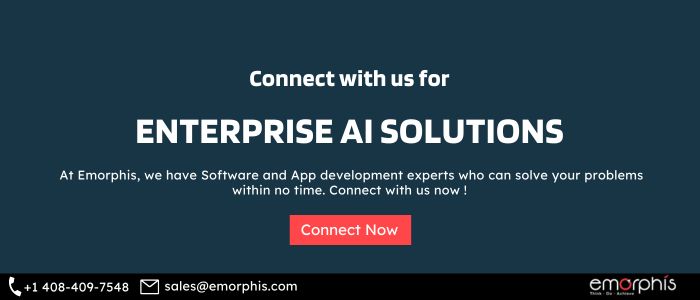
Enterprise AI enables organizations to automate processes, augment decision-making, and personalize experiences in ways that were previously unimaginable. By harnessing the power of AI-driven insights and automation, businesses can streamline operations, enhance customer experiences, and drive growth in today's increasingly digital and competitive landscape.
Moreover, the impact of Enterprise AI extends beyond individual organizations. It has the potential to drive broader societal benefits by improving healthcare outcomes, enhancing education, and addressing pressing global challenges such as climate change and resource scarcity.
However, realizing the full potential of Enterprise AI requires a strategic and thoughtful approach. Organizations must invest in talent, technology, and resources, foster a culture of experimentation and innovation, and prioritize ethical considerations to ensure responsible AI deployment.
As we look to the future, the transformative potential of Enterprise AI is boundless. By embracing AI technologies and embracing a mindset of continuous learning and adaptation, organizations can stay ahead of the curve, drive meaningful change, and shape the future of business operations for years to come.
Reach out to an AI Software Development Services Company to delve into diverse use cases tailored to your industry.



